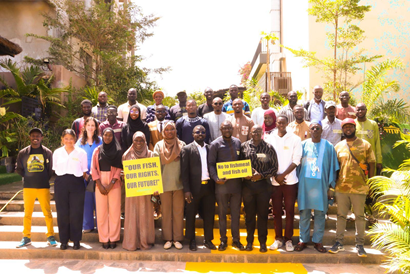By Nelson Manneh
In a mission aimed at deepening its understanding of environmental issues in The Gambia, the global environmental campaign network Greenpeace on Monday, April 7, met with local environmental activists to discuss the country’s sustainability efforts, grassroots struggles, and the threats posed by unregulated exploitation of natural resources.
The fact-finding engagement brought together environmental advocates from across the country, offering a platform to exchange views, identify urgent concerns, and explore avenues for collaboration on future campaigns. Greenpeace representatives said the visit is part of the network’s strategy to strengthen connections with local movements and shape more effective action plans for environmental protection.
“Greenpeace is a movement of people who are passionate about defending the natural world from destruction,” said Kaly Bah, a representative of the initiative. “Our vision is a greener, healthier, and more peaceful planet, one that can sustain life for generations to come. We are independent — we do not accept funding from governments, corporations, or political parties.”
Founded on principles of non-violence and creative confrontation, Greenpeace operates globally through a decentralized network of national and regional offices, united under Greenpeace International. The organization is known for its bold protests and investigative campaigns that challenge environmental abuses around the world.
Local voices at the gathering emphasized the gravity of environmental degradation in The Gambia, particularly in coastal communities.
Lamin Jassey, a long-time environmental advocate from Gunjur, lamented the depletion of the country’s fish stocks. “The Gambia has rich aquatic resources, especially fish,” he said. “But with the arrival of industrial fishing trawlers, the sea is being harvested at an unsustainable rate.”
He recalled a time when fish was abundant and easily accessible to coastal communities. “Now fish has become a precious commodity — scarce and unaffordable for the poor. These foreign trawlers are not regulated, their fishing gear is unmonitored, and local fishermen are being pushed aside without any government intervention.”
Other activists raised concerns about the weak enforcement of environmental laws and the inaccessibility of justice for affected communities.
Muhammed Hydara, Secretary General of the Gambia Environment Alliance, welcomed Greenpeace’s involvement and urged the network to establish a permanent presence in the country.
“We need institutions like Greenpeace to help push environmental cases forward,” he said. “Our biggest challenge is the legal system. Environmental laws are outdated, and legal fees are prohibitively expensive. We have many pending cases because communities can’t afford the legal support they need.”
The dialogue highlighted both the resilience of Gambian environmentalists and the systemic challenges they face in holding powerful actors accountable. Activists expressed hope that the Greenpeace mission will lead to deeper collaboration and increased global attention to their efforts.
As climate change, overfishing, and environmental neglect continue to impact The Gambia’s ecosystems and communities, voices on the ground are calling for action — and partners who will stand with them in defense of their land, water, and future.


















